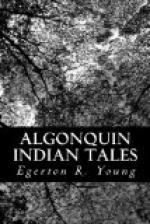“But Nanahboozhoo did not long continue to look like a rabbit. As he was superior to other people he could change himself to any form he liked. He was most frequently seen as a fine strong young Indian hunter. He called the people his uncles. When he grew up he said to his grandmother, the old Nokomis, that the time had come when he should prepare himself to go and help his uncles, the people, to better their condition. This he was able to do, seeing he was more than human, for his father was the West Wind and his mother a great-granddaughter of the moon. Sometimes he was the beautiful white rabbit; then he would be a wolf or a wolverine; then he would be a lovely bird. He could even change himself to look like a dry old stump or a beautiful tree. Sometimes he would be like a little half-frozen rabbit; then he would be a mighty magician, and often a little snake. He was just as changeable in his disposition as in his outward appearance. Sometimes he was doing the best things imaginable for his uncles, the Indian people, and at other times he was full of mischief and trickery. But on the whole he was a friend, and although quick-tempered and fiery yet he did lots of fine things for the people, for he was really one of the best of the Munedoos of the early times.
“When the time came for him to leave his grandmother’s wigwam he built one for himself, and then he asked Nokomis to prepare for him the sacred magical musical sticks which she alone could make. His grandmother made him four sticks, and with these he used to beat time when singing his queer songs. Some of them were very queer, and ended up with ’He! he! ho! ho! ha! ha! hi! hi!’ Others were in reference to some special benefits he would confer on his uncles. In one of them, referring to his going to steal the fire for them, he sings:
“’Help to my uncles I’m
bringing,
Their sorrows I’ll change into singing.
From their enemies the fire I’ll
steal,
That its warmth the children may feel.
“’Disguised will be Nanahboozhoo,
That his work may the better be done;
But his jolly deeds ever will tell who
Has been sporting around in his fun.’
“At first he was a jolly fellow, full of fun, and did lots of good things for his uncles. He showed them the plants and roots good for food, and taught them the arts of surgery and medicine, but as the years went by he did some things that caused him to be feared very much. His uncles always went to him when they got into trouble, but whether he would help them or not depended much on the humor he was in when they came.
[Illustration: The beautiful reflections in the water.]




